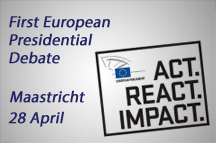.jpg) For the first time ever, leading candidates for the European Commission presidency took part in a presidential debate ahead of the 22-25 May European elections. “History is being made tonight.” These were the opening words of Isabelle Kumar from euronews, which broadcast the debate live on Monday 28th April.
For the first time ever, leading candidates for the European Commission presidency took part in a presidential debate ahead of the 22-25 May European elections. “History is being made tonight.” These were the opening words of Isabelle Kumar from euronews, which broadcast the debate live on Monday 28th April.
The top four candidates were present: Jean-Claude Juncker, European People’s Party (EPP), Martin Schulz, Party of European Socialists (S&D), Guy Verhofstadt, Alliance of Liberals and Democrats for Europe Party (ALDE) and Ska Keller, European Green Party (Greens/EFA). Alexis Tsipras, Greek leftist leader, declined the invitation.
 The first in a series of debates was held in Maastricht, where the Treaty of Maastricht created the European Union as it is known today and where the foundations were laid for the Euro. The televised debate was organised by Maastricht University, the City of Maastricht and the European Youth Forum.
The first in a series of debates was held in Maastricht, where the Treaty of Maastricht created the European Union as it is known today and where the foundations were laid for the Euro. The televised debate was organised by Maastricht University, the City of Maastricht and the European Youth Forum.
Issues discussed were selected from questions submitted over the last few weeks by students from around the continent. Topics covered during the evening included youth unemployment, energy, foreign policy, immigration, euro-skepticism and Eurobonds.
 Jean-Claude Juncker argued for a Europe that “gets things done” and is “big on big issues and small on small issues”. Martin Schulz highlighted the need to repair the damage that the debt crisis has produced in terms of economy and growth. Guy Verhofstadt pled for the creation of jobs as an absolute priority for the next five years. Finally, Ska Keller argued for more democracy and a focus on social justice and social rights.
Jean-Claude Juncker argued for a Europe that “gets things done” and is “big on big issues and small on small issues”. Martin Schulz highlighted the need to repair the damage that the debt crisis has produced in terms of economy and growth. Guy Verhofstadt pled for the creation of jobs as an absolute priority for the next five years. Finally, Ska Keller argued for more democracy and a focus on social justice and social rights.
The debate helped voters to put faces on the candidates. At one point, it was announced that 10,000 tweets a minute were coming in. Yet they failed to impress. A snap poll conducted by Europe Decides disclosed Guy Verhofstadt, a former Belgian prime minister, as the winner, but the debate was not groundbreaking and ‘never turned nasty’.
 The next president of the EU executive will be nominated by EU Heads of States and Governments in the European Council. However, since the Lisbon Treaty (2009), Article 17 of the Treaty on European Union states that the European Council will have to take into account the results of the European Parliament elections. Consequently, for the first time, five European parties have nominated a candidate or ‘Spitzenkandidat’ to lead the EU executive for the next five years.
The next president of the EU executive will be nominated by EU Heads of States and Governments in the European Council. However, since the Lisbon Treaty (2009), Article 17 of the Treaty on European Union states that the European Council will have to take into account the results of the European Parliament elections. Consequently, for the first time, five European parties have nominated a candidate or ‘Spitzenkandidat’ to lead the EU executive for the next five years.
Turnout at previous European Elections has steadily declined since 1979. In 2009, a record low turnout of 43% was recorded. The aim of these debates, therefore, is to raise public interest and show citizens that their vote matters in order to increase turnout at the 22-25 May elections.
The next debates will be held between 7-9 May in Florence, Italy (broadcast by RAI) and on 15th May at the European Parliament. The latter will be broadcast by Eurovision and EBS and made available to national broadcasters, including the BBC.












